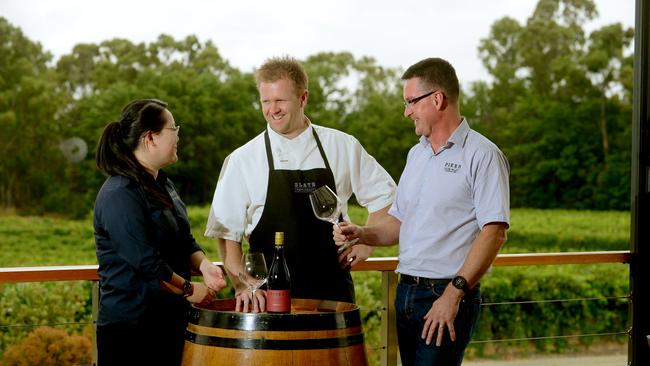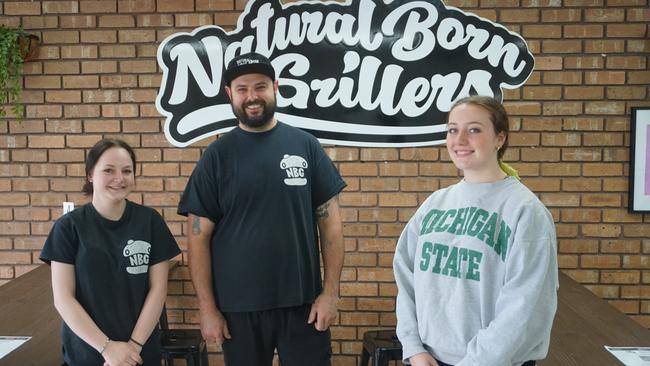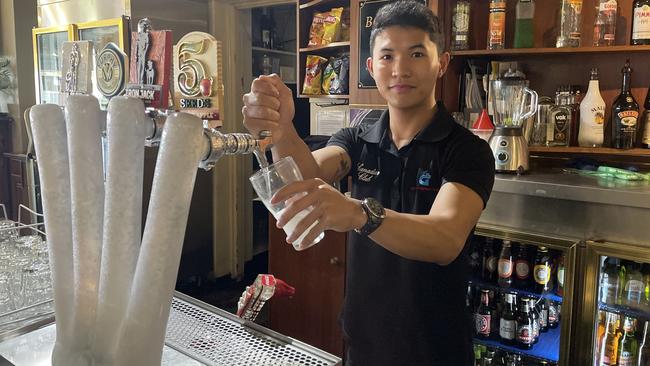Where regional bosses are hiring in South Australia
Bosses in the bush are crying out for staff to fill key roles. This is where they are and what they’ve got for workers prepared to make the big move.
SA News
Don't miss out on the headlines from SA News. Followed categories will be added to My News.
Regional South Australian leaders are urging skilled workers to move to the bush, where hundreds of jobs are there for the taking in a broad range of industries.
There are more than 1100 vacancies outside Adelaide advertised on seek.com.au alone, including 169 trades positions, 148 in health and medical fields, 123 in hospitality and tourism, and 105 in community services such as aged and disability support.
It comes after new Australian Bureau of Statistics data showed the number of job vacancies statewide had risen to the highest level in a decade, with about 15,600 up for grabs last November.
It was also revealed that workers are being flown in from Vanuatu to pick fruit because South Australians will not take the jobs, after Acting Prime Minister Michael McCormack urged the unemployed to switch “Stan and Netflix off” and head to the regions for a job.
Murray Bridge Mayor Brenton Lewis said his region relied heavily on skilled migrants in the past but the intake had dried up since the COVID-19 pandemic hit.
“I constantly hear from owners of small businesses and medium-sized businesses that they are having difficulty recruiting good, skilled workers,” he said. It’s constant.” Mr Lewis called on people to consider moving to the regions, citing cost of living as a major drawcard.
“I think there’s every reason to look to a region … you can buy a really solid home in Murray Bridge for under $400,000,” he said.
The needs of regional economies and the benefit to individuals willing to take up work are why the Sunday Mail and The Advertiser have launched a regional jobs noticeboard on advertiser.com.au for employers to post their vacancies.
Yorke Peninsula Mayor Darren Braund said his region was struggling to attract skilled workers.
“I’ve noticed in our council it is very hard to fill positions like building surveyors, environmental officers and health officers,” he said.
“Like most regional areas, there’s always a shortage of doctors.”
Mr Braund said the shortage be because of SA regions not being able to compete with Adelaide salaries.
“We can’t always match some of the salaries and shopping experiences of the city, but the lifestyle is incredible, with the beach and the sea on every doorstep,” he said.
“We would love people to consider that.”
A new analysis of job demand by the Department of Primary Industries and Regions showed the total workforce required for cherry-picking across the Hills, Fleurieu Peninsula and Kangaroo Island was estimated at 1880 this month.
The demand would then drop to an estimated 188 positions between February and September.
Seasonal demand was also high for grapepicking and winemaking jobs in the Murraylands and Riverland, with estimates showing a total job demand of 2586 in the industry for January to March.
Primary industries minister David Basham said a $4.45m regional job support package announced last month was targeting older workers, international students, gap-year students and others who had the flexibility to take up short-term work.
“At the same time, we are putting out a call to action to anyone who is available to take up seasonal and regional work,” Mr Basham said.

Why wouldn’t you want to work here?
By Rebecca Baker
TO Wayne Butcher, choosing to live and work in regional South Australia is a no-brainer, especially when you can do it in the picturesque Clare Valley.
It’s why he finds it so hard to comprehend the difficulty business owners in the rich wine and farming region have in sourcing staff.
“People have invested good money to create some really good food and dining experiences in the Clare Valley but staffing becomes an issue – it’s the hard part,” the general manager at Pikes Wines, at Sevenhill, said.
“The end result is you just can’t offer the service you would like to, you have to wind back. So, instead of being able to do 75 at lunch you might only be able to do 50.
“It really is frustrating as you have all these great things you want to do – special themed dinners and special events – but you just don’t have the staff to do it.”
Mr Butcher, who is looking for a chef, said finding suitably qualified staff had become more difficult on the back of COVID-19. He said people didn’t realise what they were missing out on by not wanting to leave the city limits.
“I live in Auburn, it has 320 people, it is gateway to the Clare Valley, we have a service station, a great supermarket, we have a lovely restaurant, we have a pharmacy, a post office, coffee shops, no traffic lights … housing is more affordable,” he said.
Yorke and Mid North Regional Development chief executive Kelly-Anne Saffin is similarly perplexed.
“At one stage in November we had 450 vacancies listed … hospitality staff – cooks, chefs, front bar staff – but also health and support workers in disability and childcare services, in addition to trade and trade assistants,” she said. “None of the towns in our region are more than two hours out of Adelaide.”

Plenty of work for those who will move
By Jessica Ball
South Australia’s second-largest city is struggling to entice skilled workers.
More than 200 jobs are available at Mount Gambier and the Limestone Coast and that is expected to double by the end of the month.
Business and workforce development manager Rachael Ashman said every industry had employment opportunities advertised on the Regional Development Australia Limestone Coast (RDALC) job board.
“We regularly see vacancies in the healthcare and support services (aged and disability care), in skilled trades such as welding, fitting and machining and chefs/cooks,” she said.
“There’s also work in our agricultural sector, including dairy workers and farmhands.”
Mount Gambier burger shop Natural Born Grillers has been trying to hire a chef and supervisor for almost a year.
Owner Ben Hull said it was easy to find young, eager workers for front of house and delivery roles but a chef shortage was plaguing the region.
While he said the business had been lucky during the pandemic, JobSeeker payments affected the search for staff.
“We’ve been looking for someone since well before COVID,” Mr Hull, pictured, said. “We haven’t suffered a loss of business but we have definitely noticed that people don’t want to work,”
Ms Ashman said the RDALC was working hard to encourage job seekers to relocate.
“COVID-19 has created a widespread acceptance of ‘working from home’ and I think that this will be an advantage for regions looking to attract workers keen on leaving the cities … especially a beautiful region like the Limestone Coast,” she said.
Mount Gambier Chamber of Commerce president Hayley Neumann said it was crucial to attract skilled workers. However, a rental shortage and transportation options were a deterrent.

Tourist influx leaves hotels, cafes begging for staff
By Emily Jarvis
Port Lincoln is the perfect place to dine out – but while there is plenty of fresh local seafood on offer, employers say they are struggling to find people to serve it.
Jack Ritchie, chairman of the Port Lincoln Chamber of Commerce, said the hospitality and tourism sector has been desperate for people to work, mainly because of the influx of tourists in the busy summer months.
“I know some venues have taken on staff and are prepared to train them on the job rather than wait for people with experience to apply,” he said.
Mr Ritchie said the shortage may be due to a lack of full-time work on offer or because of the increased JobSeeker payments.
He said that if locals weren’t willing to take local jobs, businesses needed to attract professionals who wanted a change of scenery.
“If there are a shortage of people locally at the moment, then we potentially have to attract more people from other areas which then becomes a part-job, part-lifestyle choice,” Mr Ritchie said. “That then starts to overlap with tourism promotion and everything starts to link together.
“We have found that prior to this, 90 per cent of people from Adelaide haven’t been to Port Lincoln.
“Now what we’re seeing are all visitors from Adelaide, and that I think that will drive many more recommendations to others coming through.” Grand Tasman Hotel venue manager Bradley Briggs said he was, at one stage, willing to hire people off the street.
“We were begging anybody to come and work,” he said.
“If you were walking down the street looking for a job, you had one here straight away.
“You could have been the worst of the worst but we needed to have people in here. We went into the Christmas period with some fresh faces, and we just had to throw them in the deep end with 200 people for dinner every night.”
Having only six staff at the peak of COVID-19 shutdowns, Mr Briggs said there was no incentive for people to actively look for work.
“There was no incentive to come back and work because of the JobSeeker and JobKeeper payments” he said.
“I’ve got staff who do 20 hours a week but don’t even earn the $500-plus a week they were getting.
“We’re finding that with Christmas being over, people have spent their money and are now looking to commit to a job again.”





